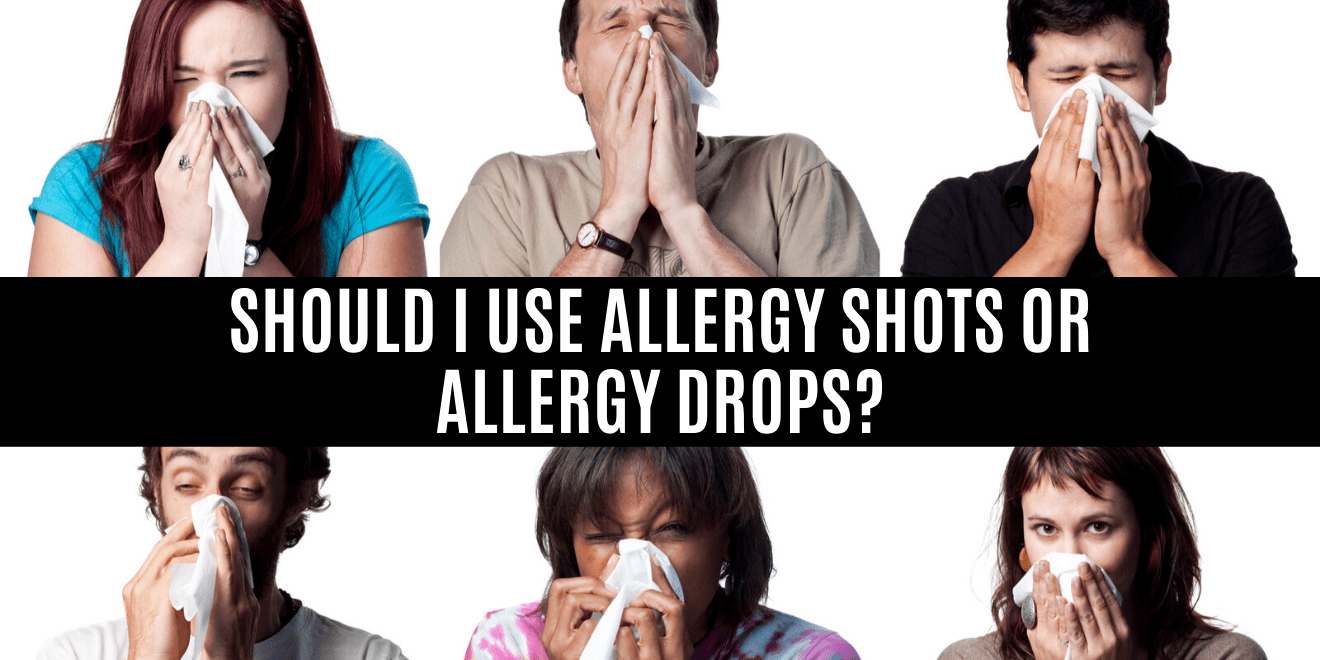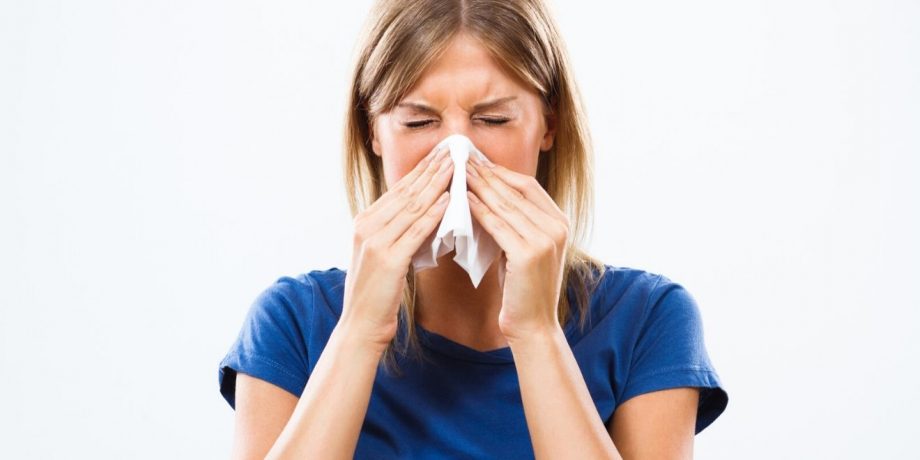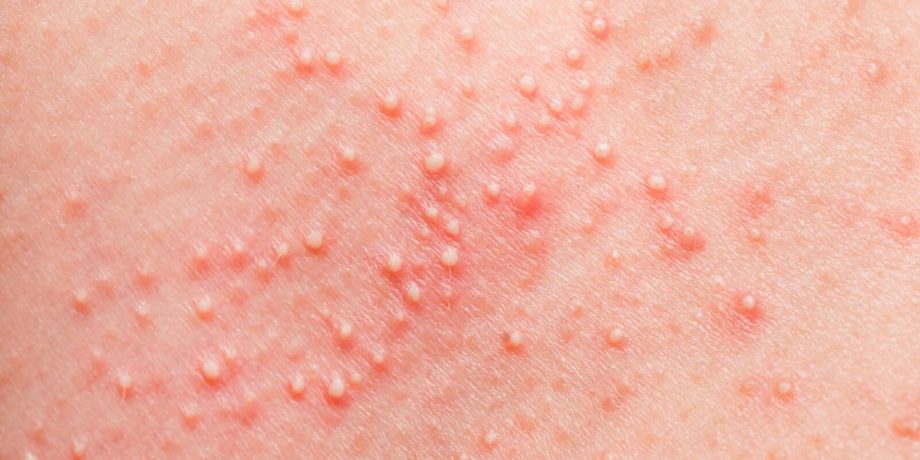Should I use Allergy Shots or Allergy Drops?

Allergies are common for all types of people.
Even those who did not previously experience allergies are susceptible to getting them later in life.
Allergic reactions can occur from dust mites, mold, food, pollen, and many other substances. The best treatment for allergies depends on the individual.
Allergies are caused by a reaction in one’s immune system. When an immune system finds something dangerous entering the body, it can respond by attacking it. When an immune system overreacts to a substance that is not dangerous, it is considered an allergic reaction.

Both genetics and the environment play a significant role in allergic reactions. In years where pollen is particularly heavy, people who rarely experience allergic reactions may find themselves with a runny nose or sore throat. Food allergies tend to run in families and may rely more on genetics.
Allergic reactions can cause a variety of symptoms that range from mild to severe. For severe allergies, medical attention may be required.

There are several different types of allergies. Depending on which one an individual has, their symptoms may vary. Food allergies can cause swelling of the lips and difficulty breathing. Severe allergic reactions to food may even require hospitalization. Insect allergies frequently cause swelling and hives.
● Itchy rashes
● Asthma
● Swelling or redness
● Runny nose
● Sneezing
● Sore throat
● Anaphylaxis
Depending on the type and level of severity, different treatment options work best depending on the individual. Allergy shots are typically administered at regular intervals over a long period. A typical timespan for allergy shots ranges anywhere from three to five years.

These shots consist of the specific substance that triggers the individual’s allergy. Because this type of treatment is considered immunotherapy , the immune system can be stimulated without an allergic reaction. When built up over time, this prepares the body to better tolerate the substance that once caused an allergic reaction.
Shots used for an allergic reaction are frequently administered when medication is not enough to successfully treat allergies. They are effective at treating seasonal allergies including pollen, mold allergies, and pet allergies.
Allergy drops are commonly used for those who can not tolerate the shots. This is a safe alternative to both the shots and pill-form medication. While it has been used with great success in Europe, it has only recently become popular in the United States.
Allergy drops can be used for allergic conjunctivitis, rhinitis, and asthma. Since this is also a form of immunotherapy, a small amount of the substance that the individual is allergic to is used.

One key difference between shots and drops used for allergic reactions is how they are administered. The shots require a doctor’s visit. Allergy drops can be taken at home once a day. Another difference involves the way they are tested. Allergy drops are not yet approved by the FDA. Both treatment options are typically administered between three to five years.
Allergy shots are found to have overall positive results for those that properly use them. Typically these shots work best when used over a longer time. Using allergy shots for only one year may not have the same desired effect.
Although the majority of people respond well to these shots, they can have a negative impact. Redness from the actual administration of the shot is common. Swelling or irritation can happen at the point of injection. An immune system reaction may also occur. This can cause sneezing or even hives. In rare cases, anaphylaxis can cause difficulty breathing and may require hospitalization. For most people, side effects are minimal.
Allergy drops usually do not cause any serious reactions. Mild to moderate symptoms have been documented. These symptoms can include itchy eyes, mouth irritation, upset stomach, and hives. Although most allergy drops are not FDA approved, their effects have been monitored for safety precautions.
Allergies can range in severity. While mild allergies may disappear relatively quickly, other allergies may linger. If you are experiencing significant distractions caused by the symptoms of allergies, it may be difficult to function. Discomfort at home, working or problems with sleep can all have an impact on the quality of life. If allergies are making life difficult to manage, seeing an allergy doctor may be the first step to effective treatment.

Allergy medications can cause side effects and may not work for everyone. Even prescription allergy medications can be difficult to tolerate for some. Using shots or drops can help relieve allergy symptoms over time. To discuss the best treatment available, finding the right allergy professional to diagnose the problem is crucial.
Even those who did not previously experience allergies are susceptible to getting them later in life.
Allergic reactions can occur from dust mites, mold, food, pollen, and many other substances. The best treatment for allergies depends on the individual.
What Causes an Allergic Reaction?
Allergies are caused by a reaction in one’s immune system. When an immune system finds something dangerous entering the body, it can respond by attacking it. When an immune system overreacts to a substance that is not dangerous, it is considered an allergic reaction.

Both genetics and the environment play a significant role in allergic reactions. In years where pollen is particularly heavy, people who rarely experience allergic reactions may find themselves with a runny nose or sore throat. Food allergies tend to run in families and may rely more on genetics.
Common Allergy Symptoms
Allergic reactions can cause a variety of symptoms that range from mild to severe. For severe allergies, medical attention may be required.

There are several different types of allergies. Depending on which one an individual has, their symptoms may vary. Food allergies can cause swelling of the lips and difficulty breathing. Severe allergic reactions to food may even require hospitalization. Insect allergies frequently cause swelling and hives.
Runny nose, coughing, sore throat, and watery eyes may initially be thought of as a cold when in reality it could be hay fever or allergic rhinitis
7 common symptoms that can occur from any allergic reaction include:
● Itchy rashes
● Asthma
● Swelling or redness
● Runny nose
● Sneezing
● Sore throat
● Anaphylaxis
Allergy Treatment Options: Drops vs. Shots
Depending on the type and level of severity, different treatment options work best depending on the individual. Allergy shots are typically administered at regular intervals over a long period. A typical timespan for allergy shots ranges anywhere from three to five years.

These shots consist of the specific substance that triggers the individual’s allergy. Because this type of treatment is considered immunotherapy , the immune system can be stimulated without an allergic reaction. When built up over time, this prepares the body to better tolerate the substance that once caused an allergic reaction.
Shots used for an allergic reaction are frequently administered when medication is not enough to successfully treat allergies. They are effective at treating seasonal allergies including pollen, mold allergies, and pet allergies.
Allergy drops are commonly used for those who can not tolerate the shots. This is a safe alternative to both the shots and pill-form medication. While it has been used with great success in Europe, it has only recently become popular in the United States.
Allergy drops can be used for allergic conjunctivitis, rhinitis, and asthma. Since this is also a form of immunotherapy, a small amount of the substance that the individual is allergic to is used.

One key difference between shots and drops used for allergic reactions is how they are administered. The shots require a doctor’s visit. Allergy drops can be taken at home once a day. Another difference involves the way they are tested. Allergy drops are not yet approved by the FDA. Both treatment options are typically administered between three to five years.
Prognosis
Allergy shots are found to have overall positive results for those that properly use them. Typically these shots work best when used over a longer time. Using allergy shots for only one year may not have the same desired effect.
Although the majority of people respond well to these shots, they can have a negative impact. Redness from the actual administration of the shot is common. Swelling or irritation can happen at the point of injection. An immune system reaction may also occur. This can cause sneezing or even hives. In rare cases, anaphylaxis can cause difficulty breathing and may require hospitalization. For most people, side effects are minimal.
Allergy drops usually do not cause any serious reactions. Mild to moderate symptoms have been documented. These symptoms can include itchy eyes, mouth irritation, upset stomach, and hives. Although most allergy drops are not FDA approved, their effects have been monitored for safety precautions.
When To See A Doctor
Allergies can range in severity. While mild allergies may disappear relatively quickly, other allergies may linger. If you are experiencing significant distractions caused by the symptoms of allergies, it may be difficult to function. Discomfort at home, working or problems with sleep can all have an impact on the quality of life. If allergies are making life difficult to manage, seeing an allergy doctor may be the first step to effective treatment.

Allergy medications can cause side effects and may not work for everyone. Even prescription allergy medications can be difficult to tolerate for some. Using shots or drops can help relieve allergy symptoms over time. To discuss the best treatment available, finding the right allergy professional to diagnose the problem is crucial.




































































































